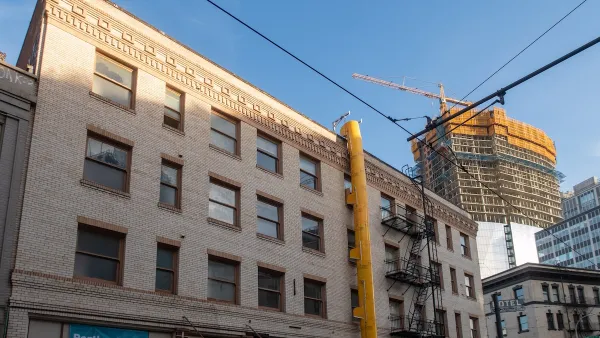A set of proposals aimed at improving housing affordability will go before the Denver City Council after approval by a committee.

Three affordable housing proposals will be presented at a public meeting before the Denver City Council, reports Joe Rubino. “The policy mandates all new housing projects of 10 or more units include at least 8% affordable housing units or face steep fees. It also greatly increases fees on most other kinds of development in the city to fund other affordable housing efforts.”
The committee approved two amendments, one of which lets developers avoid building on-site parking by committing to a larger number of affordable units in their projects. “Under the version of the policy advanced by the planning board earlier this month, only projects within 1/4 mile of a rail stop in the city would be eligible for the exemption from providing parking. [Councilwoman Amanda Sandoval]’s amendment would expand that to any project within 1/4 of a mile of any high- or medium-capacity transit corridor in the city where the city has invested in better transportation infrastructure.” This amendment, Rubino notes, is likely to face opposition in the full City Council.
“The [second] amendment, which was unanimously approved, dictates that all development projects in the city’s pipeline at the time the affordable housing policy takes effect will still pay linkage fees that rise with inflation.” However, “The policy would do away with the inflation-based model in favor of a much steeper graduated increase to the linkage fees schedule” for future projects.
Nine other amendments intended to set higher standards for affordability in neighborhoods “vulnerable to gentrification and displacement” were voted down by the committee.
FULL STORY: Denver’s controversial affordable housing proposal avoided a major overhaul. Here’s how it did change.

Planetizen Federal Action Tracker
A weekly monitor of how Trump’s orders and actions are impacting planners and planning in America.

Map: Where Senate Republicans Want to Sell Your Public Lands
For public land advocates, the Senate Republicans’ proposal to sell millions of acres of public land in the West is “the biggest fight of their careers.”

Restaurant Patios Were a Pandemic Win — Why Were They so Hard to Keep?
Social distancing requirements and changes in travel patterns prompted cities to pilot new uses for street and sidewalk space. Then it got complicated.

Platform Pilsner: Vancouver Transit Agency Releases... a Beer?
TransLink will receive a portion of every sale of the four-pack.

Toronto Weighs Cheaper Transit, Parking Hikes for Major Events
Special event rates would take effect during large festivals, sports games and concerts to ‘discourage driving, manage congestion and free up space for transit.”

Berlin to Consider Car-Free Zone Larger Than Manhattan
The area bound by the 22-mile Ringbahn would still allow 12 uses of a private automobile per year per person, and several other exemptions.
Urban Design for Planners 1: Software Tools
This six-course series explores essential urban design concepts using open source software and equips planners with the tools they need to participate fully in the urban design process.
Planning for Universal Design
Learn the tools for implementing Universal Design in planning regulations.
Heyer Gruel & Associates PA
JM Goldson LLC
Custer County Colorado
City of Camden Redevelopment Agency
City of Astoria
Transportation Research & Education Center (TREC) at Portland State University
Camden Redevelopment Agency
City of Claremont
Municipality of Princeton (NJ)





























